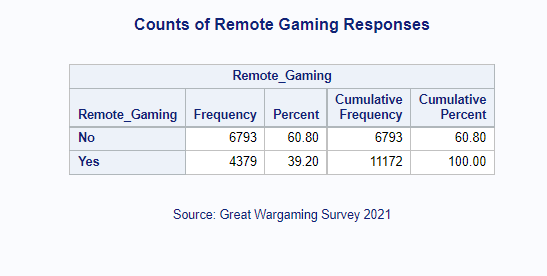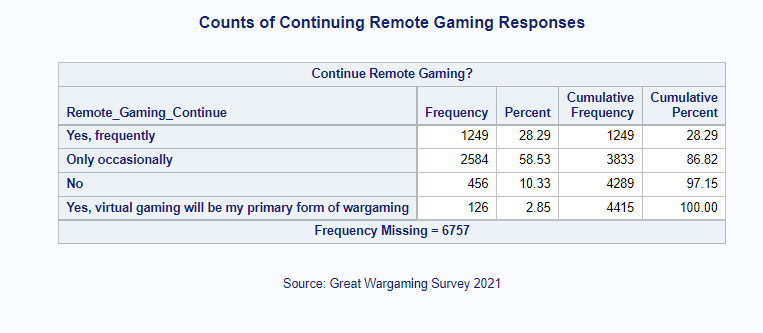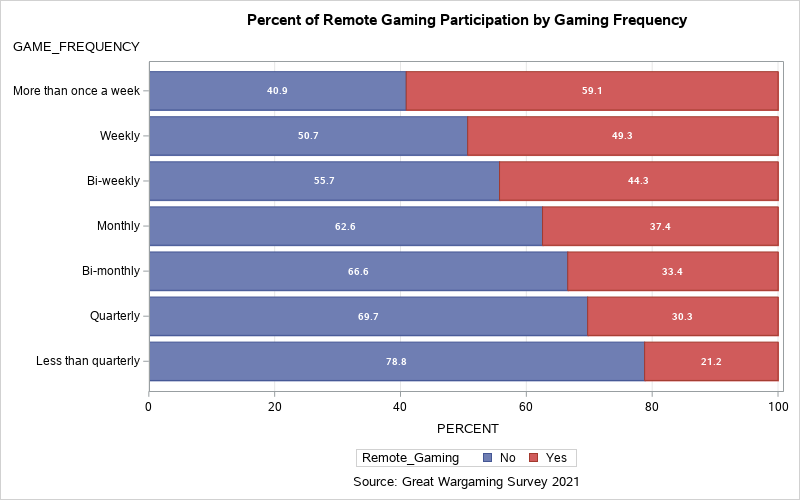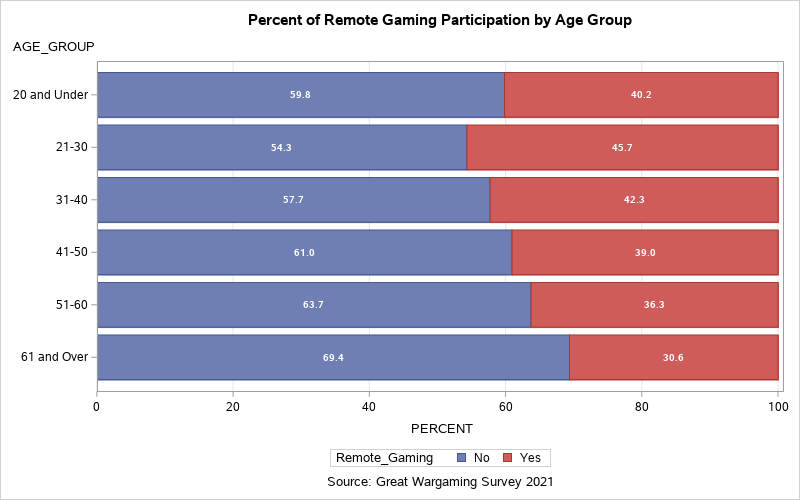GWS 2021: Remote gaming
With survey results tallied, it's time to begin looking at the data of this year's The Great Wargaming Survey (GWS2021). Kicking off the analysis, I take a look at remote gaming
Having made the leap into remote miniature wargaming almost a year ago, I was especially interested in seeing responses to the two new survey questions relating to remote wargaming. Those two questions asked about remote gaming participation, and continuation. When considering this topic and the questions asked, a few of the questions that came to mind were:
 Table 1[/caption]
With a total response of 11,172 respondents (the largest response total to date, I think), does remote gaming represent a small percentage of gaming activity when compared to Face-to-Face gaming?Table 1 suggests otherwise.
Based upon the GWS2021, 39% of respondents marked that they had participated in remote or virtual gaming. 39 percent! This is a much larger percentage than I imagined. Perhaps the notion and implementation of remote gaming are not so niche?
Table 1[/caption]
With a total response of 11,172 respondents (the largest response total to date, I think), does remote gaming represent a small percentage of gaming activity when compared to Face-to-Face gaming?Table 1 suggests otherwise.
Based upon the GWS2021, 39% of respondents marked that they had participated in remote or virtual gaming. 39 percent! This is a much larger percentage than I imagined. Perhaps the notion and implementation of remote gaming are not so niche?
 Table 2[/caption]
Seeing that 39% of respondents admitted to participating in remote gaming during the last year, how many plan to continue gaming remotely? Perhaps remote gaming is only a fad that will fade quickly? Again, the data suggests otherwise. See table 2 below.
To me it was surprising that only 10% of respondents marked that, 'No', they would not continue remote wargaming. Perhaps remote wargaming may have some staying power after all?
Table 2[/caption]
Seeing that 39% of respondents admitted to participating in remote gaming during the last year, how many plan to continue gaming remotely? Perhaps remote gaming is only a fad that will fade quickly? Again, the data suggests otherwise. See table 2 below.
To me it was surprising that only 10% of respondents marked that, 'No', they would not continue remote wargaming. Perhaps remote wargaming may have some staying power after all?
 Figure 1[/caption]
While remote gaming allows gaming to continue even when F2F gaming is not possible or discouraged, do gamers participating in remote gaming play more frequently? Since that direct question cannot be answered specifically from the survey, can we infer that increases in remote gaming contribute to increased gaming?
Figure 1 suggests this might hold true, since those gaming more than once per week game remotely more than F2F.
Converting these counts to percentages, what do we find (see Figure 2)?
[caption id="attachment_71488" align="aligncenter" width="800"]
Figure 1[/caption]
While remote gaming allows gaming to continue even when F2F gaming is not possible or discouraged, do gamers participating in remote gaming play more frequently? Since that direct question cannot be answered specifically from the survey, can we infer that increases in remote gaming contribute to increased gaming?
Figure 1 suggests this might hold true, since those gaming more than once per week game remotely more than F2F.
Converting these counts to percentages, what do we find (see Figure 2)?
[caption id="attachment_71488" align="aligncenter" width="800"] Figure 2[/caption]
The survey suggests that the more frequently people game, the more likely they are to embrace remote gaming. Since one must have a motivation to overcome the barriers and challenges in diving into remote gaming, those gaming more frequently take on that challenge to tackle these hurdles. Less frequent gaming carries with it a corresponding reduction in urgency to scale the learning curve. From my experience, this inference fits. An interesting result, I think.
Figure 2[/caption]
The survey suggests that the more frequently people game, the more likely they are to embrace remote gaming. Since one must have a motivation to overcome the barriers and challenges in diving into remote gaming, those gaming more frequently take on that challenge to tackle these hurdles. Less frequent gaming carries with it a corresponding reduction in urgency to scale the learning curve. From my experience, this inference fits. An interesting result, I think.
 Figure 3[/caption]
There you have it. A first look at GWS2021 survey results leading off on a topic I find interesting. Did I learn anything from this analysis? Yes. Remote gaming seems more mainstream than I thought and appears here to stay.
Personally, my gaming frequency has exploded with the introduction of remote gaming. Going from fewer than one game per month to more than one per week has been astounding. My circle of gaming friends has grown as well. Really grown. Thanks for the explosion in my gaming activity falls primarily onto two fellow bloggers: Matt from wargamesinthedungeon and Graham at Wargaming for Grown-ups. Without their guidance and mentoring, this uptick in gaming activity might not have been possible.
Looking forward to reading comments on your experiences with remote gaming during these unusual times. How do your personal experiences mirror or differ from the results given above?
Figure 3[/caption]
There you have it. A first look at GWS2021 survey results leading off on a topic I find interesting. Did I learn anything from this analysis? Yes. Remote gaming seems more mainstream than I thought and appears here to stay.
Personally, my gaming frequency has exploded with the introduction of remote gaming. Going from fewer than one game per month to more than one per week has been astounding. My circle of gaming friends has grown as well. Really grown. Thanks for the explosion in my gaming activity falls primarily onto two fellow bloggers: Matt from wargamesinthedungeon and Graham at Wargaming for Grown-ups. Without their guidance and mentoring, this uptick in gaming activity might not have been possible.
Looking forward to reading comments on your experiences with remote gaming during these unusual times. How do your personal experiences mirror or differ from the results given above?
- Is remote gaming a niche within a niche?
- Is remote gaming a transitory means of gaming that will fade quickly after Face-to-Face (F2F) restrictions are lifted?
- Does remote gaming have an effect on gaming frequency?
- Is remote gaming age-dependent?
Participation rate
[caption id="attachment_71489" align="aligncenter" width="547"] Table 1[/caption]
With a total response of 11,172 respondents (the largest response total to date, I think), does remote gaming represent a small percentage of gaming activity when compared to Face-to-Face gaming?Table 1 suggests otherwise.
Based upon the GWS2021, 39% of respondents marked that they had participated in remote or virtual gaming. 39 percent! This is a much larger percentage than I imagined. Perhaps the notion and implementation of remote gaming are not so niche?
Table 1[/caption]
With a total response of 11,172 respondents (the largest response total to date, I think), does remote gaming represent a small percentage of gaming activity when compared to Face-to-Face gaming?Table 1 suggests otherwise.
Based upon the GWS2021, 39% of respondents marked that they had participated in remote or virtual gaming. 39 percent! This is a much larger percentage than I imagined. Perhaps the notion and implementation of remote gaming are not so niche?
Continuation
[caption id="attachment_71490" align="aligncenter" width="763"] Table 2[/caption]
Seeing that 39% of respondents admitted to participating in remote gaming during the last year, how many plan to continue gaming remotely? Perhaps remote gaming is only a fad that will fade quickly? Again, the data suggests otherwise. See table 2 below.
To me it was surprising that only 10% of respondents marked that, 'No', they would not continue remote wargaming. Perhaps remote wargaming may have some staying power after all?
Table 2[/caption]
Seeing that 39% of respondents admitted to participating in remote gaming during the last year, how many plan to continue gaming remotely? Perhaps remote gaming is only a fad that will fade quickly? Again, the data suggests otherwise. See table 2 below.
To me it was surprising that only 10% of respondents marked that, 'No', they would not continue remote wargaming. Perhaps remote wargaming may have some staying power after all?
Gaming frequency
[caption id="attachment_71486" align="aligncenter" width="800"] Figure 1[/caption]
While remote gaming allows gaming to continue even when F2F gaming is not possible or discouraged, do gamers participating in remote gaming play more frequently? Since that direct question cannot be answered specifically from the survey, can we infer that increases in remote gaming contribute to increased gaming?
Figure 1 suggests this might hold true, since those gaming more than once per week game remotely more than F2F.
Converting these counts to percentages, what do we find (see Figure 2)?
[caption id="attachment_71488" align="aligncenter" width="800"]
Figure 1[/caption]
While remote gaming allows gaming to continue even when F2F gaming is not possible or discouraged, do gamers participating in remote gaming play more frequently? Since that direct question cannot be answered specifically from the survey, can we infer that increases in remote gaming contribute to increased gaming?
Figure 1 suggests this might hold true, since those gaming more than once per week game remotely more than F2F.
Converting these counts to percentages, what do we find (see Figure 2)?
[caption id="attachment_71488" align="aligncenter" width="800"] Figure 2[/caption]
The survey suggests that the more frequently people game, the more likely they are to embrace remote gaming. Since one must have a motivation to overcome the barriers and challenges in diving into remote gaming, those gaming more frequently take on that challenge to tackle these hurdles. Less frequent gaming carries with it a corresponding reduction in urgency to scale the learning curve. From my experience, this inference fits. An interesting result, I think.
Figure 2[/caption]
The survey suggests that the more frequently people game, the more likely they are to embrace remote gaming. Since one must have a motivation to overcome the barriers and challenges in diving into remote gaming, those gaming more frequently take on that challenge to tackle these hurdles. Less frequent gaming carries with it a corresponding reduction in urgency to scale the learning curve. From my experience, this inference fits. An interesting result, I think.
Age group
As seen from findings from past surveys, age group differences typically exist. Is participation in remote gaming age-based as well? With the exception of the always undercounted 20 and Under age group category, remote gaming participation falls monotonically as age increases. Is this tendency driven by technology or preferences for social interaction? See Figure 3. [caption id="attachment_71491" align="aligncenter" width="800"] Figure 3[/caption]
There you have it. A first look at GWS2021 survey results leading off on a topic I find interesting. Did I learn anything from this analysis? Yes. Remote gaming seems more mainstream than I thought and appears here to stay.
Personally, my gaming frequency has exploded with the introduction of remote gaming. Going from fewer than one game per month to more than one per week has been astounding. My circle of gaming friends has grown as well. Really grown. Thanks for the explosion in my gaming activity falls primarily onto two fellow bloggers: Matt from wargamesinthedungeon and Graham at Wargaming for Grown-ups. Without their guidance and mentoring, this uptick in gaming activity might not have been possible.
Looking forward to reading comments on your experiences with remote gaming during these unusual times. How do your personal experiences mirror or differ from the results given above?
Figure 3[/caption]
There you have it. A first look at GWS2021 survey results leading off on a topic I find interesting. Did I learn anything from this analysis? Yes. Remote gaming seems more mainstream than I thought and appears here to stay.
Personally, my gaming frequency has exploded with the introduction of remote gaming. Going from fewer than one game per month to more than one per week has been astounding. My circle of gaming friends has grown as well. Really grown. Thanks for the explosion in my gaming activity falls primarily onto two fellow bloggers: Matt from wargamesinthedungeon and Graham at Wargaming for Grown-ups. Without their guidance and mentoring, this uptick in gaming activity might not have been possible.
Looking forward to reading comments on your experiences with remote gaming during these unusual times. How do your personal experiences mirror or differ from the results given above?